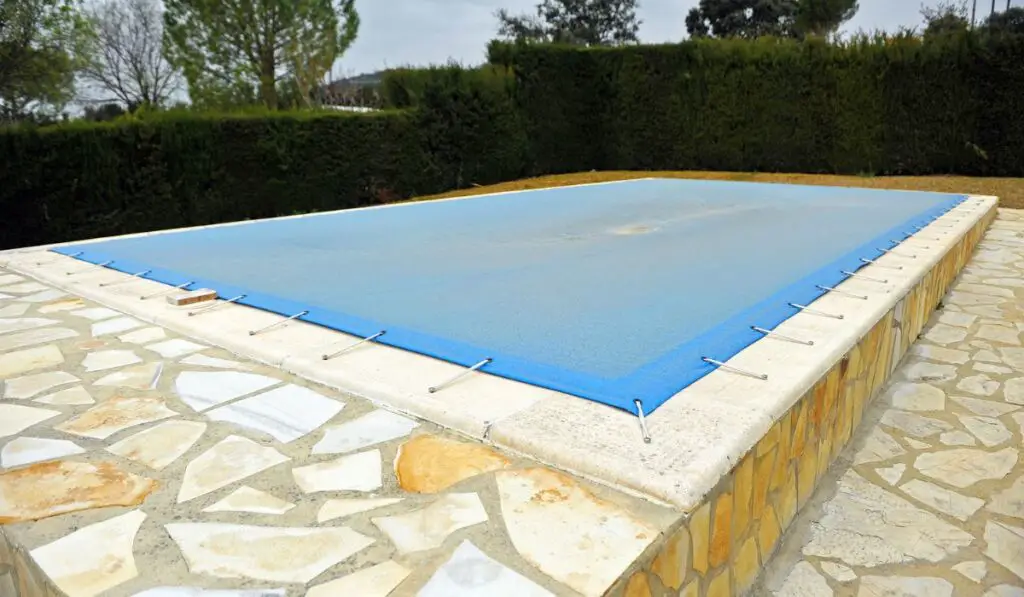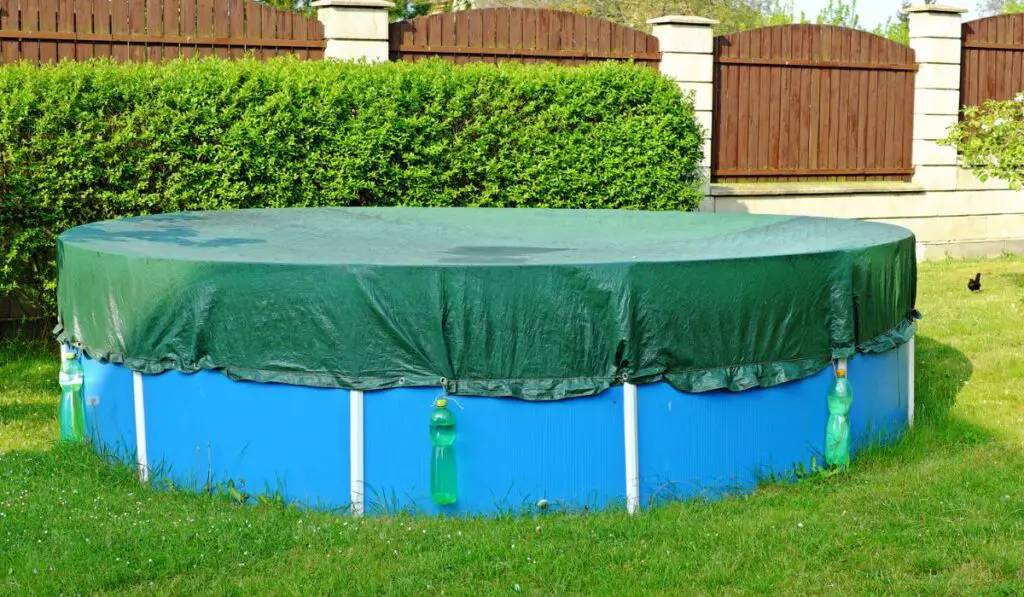Above-ground pools offer a host of advantages, including being relatively cheap and easy to install. But what happens to these pools when the winter weather comes around? Will the water inside freeze up?
Above-ground pools can freeze solid in a few days if negative temperatures persist. A thin sheet of ice on top, however, is nothing to be too concerned about. Running your pump during freezing weather can help prevent freezing and damage.
It’s best to be prepared for the possibility of your pool freezing during winter, so let’s take a look at what can happen to your pool when the weather drops and how to prevent damage.
Will an Above-Ground Pool Freeze?

During reasonably cold weather, the top layer of water in an above-ground pool will freeze solid, but the freeze may not spread further down.
However, in severely cold regions, the pool can indeed freeze completely, even faster than it happens with inground pools. It’s therefore very important to keep the water level out of the skimmer to prevent pool damage.
Even though water may not freeze totally from top to bottom in most cases, it can still ice up in unexpected parts such as through pipes and other components, causing expansion and further damage.
In freezing climates, with more than three consecutive days of temperature below 32°F, you need to use an ice compensator (on Amazon) for your above-ground pool to soak up the external ice sheet expansion as the ice sheet puts much strain on pool walls and support.
Moreover, you can use air pillows to prevent the ice sheet from freezing the ground entirely solid across the pool, as the pool walls can only take so much ice expansion.
Similarly, if the ice sheet expands into the skimmer and the water level is drained mistakenly, or the pool water seeps through the liner, significant damage will be done to the pool walls or the liner.
Do Freezing Temperatures Harm Pools?
Freezing temperatures and pools don’t go hand-in-hand, as the former set off problems for the latter. In the case of above-ground pools, the decreasing temperature could produce an iceberg in the pool, causing ruptures in the pool liner if the pool is leaking or if its water is mistakenly reduced.
The frosty weather could also cause pool cover damage, extra pressure on the pool, reduced water circulation, and more leakages.
Should You Drain Your Pool in the Winter?
You should not drain your pool during winter irrespective of the type of pool you have, whether in-ground, above-ground, or on-ground, no matter how appealing it may seem. Draining your pool will most certainly be worse than leaving all the water in, as all pools need water during the freezing period to prevent ice from forming.
Don’t drain the water from your pool throughout the winter to prevent your inground pool from bursting out of the ground or your above-ground pool from crashing within.
In addition, pool plaster textures need water to maintain certain moisture content, and if it does not get the moisture required, the plaster can discolor, wear away, and deteriorate quickly.
Can You Prevent Pool Freezing?
You can’t prevent pool freezing if you experience below-freezing outdoor temperatures for a few consecutive days. At the same time, your pump filter is not functioning to create circulation, showing your pool is freezing.
Several people believe pond heaters can help with pool freezing, but this is not so. These heaters only heat a small section around the floating disk, allowing for venting and oxygenation of winter fish ponds.
On the other hand, some other individuals wonder if adding pool antifreeze (on Amazon) to the pool is a good idea; unfortunately, it is not. Likewise, covering your pool and placing a space heater beneath it is not feasible.
You should know that the most suitable way to prevent pool freezing and avoid ice sheets from forming thickly is by running your pool pump constantly during freezing periods, ensuring all valves and pipes have water flowing through them.
How to Prevent Pool Damage From Freezing Weather

It is no news that freezing weather causes lots of damage to pools, but there are ways for you to prevent such from happening. Highlighted below are a few helpful methods:
Air Pillow
Water expands by nearly nine percent when it freezes and gets icy, but you can avoid that with air pillows (on Amazon). As you read above, an air pillow keeps the top layer of an above-ground pool from getting frozen by thwarting the water expansion caused by freezing and protecting your pool walls and skimmer from the increased density.
So if you cover maybe ten percent of your above-ground pool’s water with pillows, that should do the trick in preventing further pool damage from the freezing weather.
Safeguard the Plumbing
Plumbing in pools refers to the connected pipes, and the best way to protect them is by draining the water from them, either automatically or by unplugging the drain plugs in the equipment.
After emptying the water, safeguard the equipment from the freezing weather by covering them with thick blankets or attaching a heating cable around the pipes.
Cover Cleaning
Cover cleaning is one of the fundamental ways to care for your pool during winter to prevent it from getting damaged. You can do so by using a cover pump (on Amazon) to drain water that accumulates on the pool cover during winter and cleaning it regularly.
In addition, shield the covering by not allowing it to contact the pool water whenever you put it on. If the cover touches the pool water, it could affix to the water as the freezing begins. Not to mention, you can’t reduce the water level after your pool is iced up, so that should be done before you use the cover.
Inspect Leaks
As a pool owner, you should frequently check for leaks around your pool, and if you find any, pump more water into the pool. Doing so will prevent the ice sheet from progressing downwards and possibly tearing your pool lining.
Obtain an Ice Compensator
An ice compensator also refers to a skimmer gimmick (on Amazon), and as you read earlier in this article, it absorbs the ice as it expands in the skimmer. This prevents wall collapse or damage around the skimmer; however, the device may not be so effective if the ice layer is too thick.
Monitor Your Pool Water Level
During winter, it’s highly recommended to keep your water level below the tiles’ level, if there are any. This prevents the water from touching the tiles when it expands from freezing. Furthermore, keep the water level below the skimmer to keep it from freezing within.
Winterizing Your Pool
Whenever winter sets in, you should protect your pool pipes and equipment by winterizing them to prevent water from freezing inside them.
Your pool pump, filter, and heater can be damaged if they are not prepared well for the winter, so you should always keep the water moving through the pool system during freezing weather.
You can winterize your pool by doing the following:
- Run your pool pump and any supporting pumps 24/7 during the period of freezing temperatures.
- If you have an inground pool, install a freeze control timer to regulate the pump and heater mechanically when the temperature drops.
- Never allow your water level to decrease too much, and get rid of excess water from your pool cover.
- Do not cover your pool heater with a blanket to avoid damage to its interior.
- If there is no power and your pool stops running, sever the current to your equipment from the primary circuit and empty the water from the pump and heater, storing them within the pump basket.
